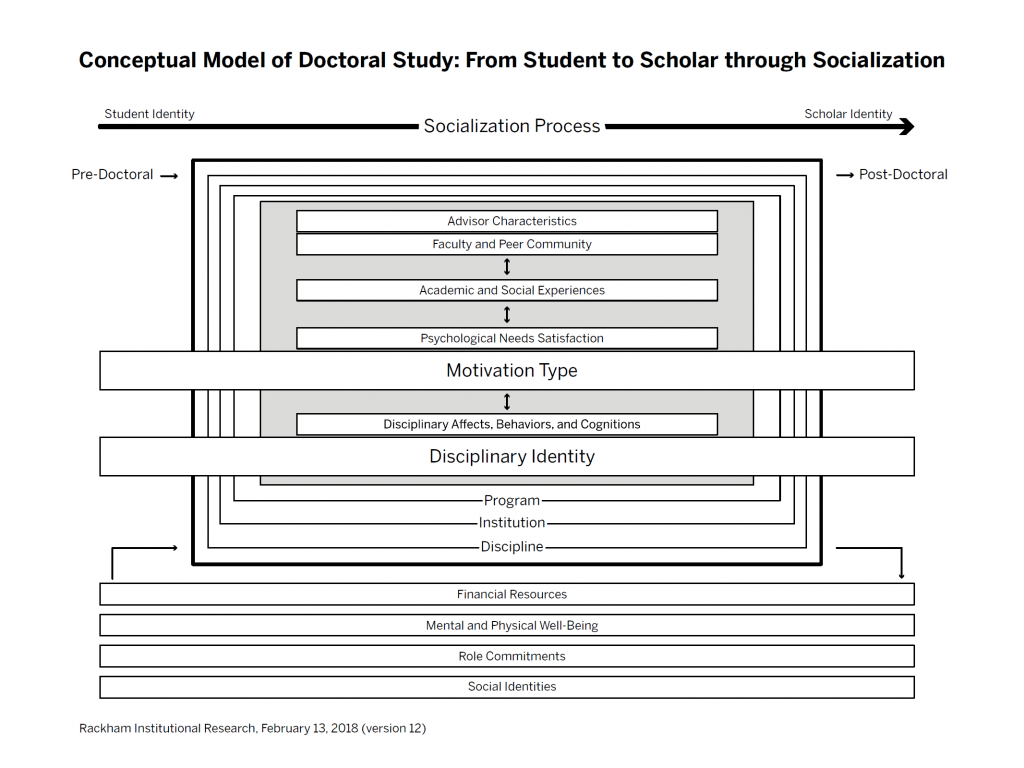About the Study
MDES surveys incoming doctoral cohorts to learn about their transition into doctoral study. It asks about the criteria students use to select doctoral programs and what motivates students to pursue doctoral study, as well as assessing their expectations, career goals, and experiences in their doctoral program. The study is longitudinal, surveying continuing students each fall and expanding to include a new entering cohort each year.
Study Design
MDES has two main design features. First, the study collects data from entire cohorts of new Ph.D. students who began a Rackham Ph.D. program in Fall 2017 and beyond (i.e., the study is a census). A census study allows Rackham researchers to measure the characteristics of sub-groups more accurately than a sample study would. By collecting data from new cohorts, it also allows Rackham to examine how incoming students’ expectations of graduate study, academic preparation, and motivation to earn a Ph.D. change over time. Second, the study collects data on an annual basis from the same students beginning in their first year of study (i.e., the study is longitudinal). This feature allows Rackham to measure growth and change within students over time, thereby providing insight into graduate students’ socialization experiences and emerging scholarly identities during the duration of doctoral study.
| 2017 Survey | 2018 Survey | 2019 Survey | 2020 Survey | 2021 Survey |
|---|---|---|---|---|
| 2017 Cohort Wave 1 | 2018 Cohort Wave 1 | 2019 Cohort Wave 1 | 2020 Cohort Wave 1 | 2021 Cohort Wave 1 |
| 2017 Cohort Wave 2 | 2018 Cohort Wave 2 | 2019 Cohort Wave 2 | 2020 Cohort Wave 2 | |
| 2017 Cohort Wave 3 | 2018 Cohort Wave 3 | 2019 Cohort Wave 3 | ||
| 2017 Cohort Wave 4 | 2018 Cohort Wave 4 | |||
| 2017 Cohort Wave 5 |
The two design features of MDES are illustrated in the figure above. In 2017 through 2021, all incoming Rackham Ph.D. students are administered Wave 1 of MDES. Wave 1 collects baseline data and information about students’ preparation for doctoral study. Characteristics of cohorts can be compared by examining Wave 1 data over multiple years.
The longitudinal nature of the study is best illustrated by following the progress of the 2017 cohort. This cohort took Wave 2 of the MDES during their second year of study, in 2018, Wave 3 during their third year of study, in 2019, and so on. Wave 2 through Wave 5 collects data on students’ experiences in their programs. By 2021, Rackham was able to possess some of the nation’s richest and most comprehensive data on Ph.D. students. This allows Rackham to disseminate findings and suggestions to the graduate education community about how doctoral training can be strengthened, leading to more equitable graduate completion rates and career outcomes in the United States. The value of the study has been recognized widely, and the survey has been extended for another five years to include cohorts from 2022 to 2026.
Conceptual Model
MDES is guided by a comprehensive conceptual framework developed by the Rackham Institutional Research staff. Drawing from professional socialization theory, the MDES framework holds that the central task of doctoral study is the development of a disciplinary identity. We define disciplinary identity as the professional identity of someone who works to advance scholarship, research, and practice within an academic discipline. Those who have high levels of disciplinary identity are committed to their field of study, feel included in a community of practice within that field of study, and have integrated their identity as a member of the discipline into their overall self-concept.
Theory suggests that individuals are socialized into holding disciplinary identities and that the people and environments that students encounter while working on their Ph.D.s play a critical role in this socialization. Interactions with the student’s advisor(s) or mentor(s), peers, and departmental faculty produce academic and social experiences.
The framework also proposes that students’ ability or willingness to engage in the socialization process depends upon how well their motivation is supported. According to self-determination theory (Deci & Ryan), individuals have three psychological needs that must be satisfied in order to support their motivation and well-being: autonomy, competence, and relatedness.

Conceptual Model of Doctoral Study: From Student to Scholar through Socialization
We hypothesize that students’ progression through doctoral programs is an iterative process by which they gradually shift their identity from being a student/knowledge consumer in their discipline to being a scholar/knowledge producer in their discipline.
